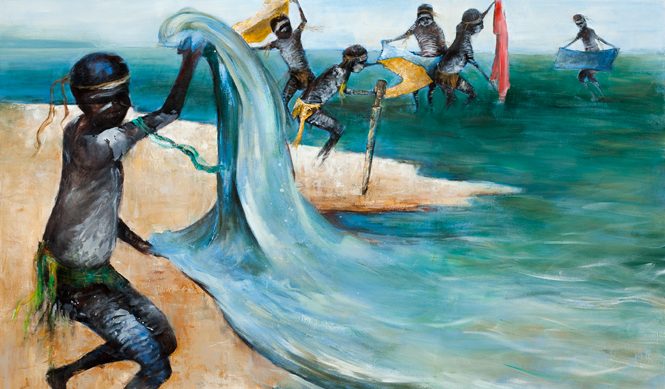As a participant of the Australia-Indonesia Muslim Exchange Program (AIMEP), I got an important explanation in understanding relation of Indonesia and Australia on the ‘Link of History and Indigenous Australia’. This topic was presented by Uncle Andrew Gardiner –an Australian Aboriginal Muslim– and Dr. Lily Yulianti Farid –Director of Makassar International Writers Festival. The following is my brief reflection on the relationship between Aboriginal tribes, Makassar fishermen, and Islam in Australia.
The advent of Islam in Australia
Relations between Indonesia and Australia are not only limited to bilateral relations, but it is more than that. Indonesia and Australia have very strong cultural and religious relations, especially the presence of Islam in Australia.
Islam in Australia is the fourth largest religion after Christianity, Atheism, and Buddhism with a population of 2.6% (604,200 people) of the total population of Australia. The presence of Islam cannot be separated from the history of the existence of Aboriginal tribes.
Islam first entered Australia through indigenous Aborigines. This took place in a trade relationship between Indonesian Makassar fishermen and Australian Aboriginal tribes around 1650 M. Fishermen from Makassar sailed to the northern coast of Australia in search of ‘sea cucumbers’. These fisherman who are predominantly Muslim have interacted with indigenous Australians for a long time for sea cucumber transactions. Some of them married Aboriginal women and lived there, had children and gave birth to the Malay-speaking Marege Aborigines.
Mutuality of cultural interaction
Not only did Makassar fishermen visit Australia, but also Aboriginal people visited Makassar. The results of Laureate Global Encounters research reveal that an Aboriginal man named Damalatja went to Makassar on a fishing boat at the end of the 19th century. After returning from Makassar, Damalatja told his family about his experience in Makassar. Among them was witnessing the activity of weaving silk fabrics carried out by Makassar women. His story became a source of inspiration for Munggerauwy Yunupingu, the son of Damalatja, who later became a famous Aboriginal painter.
The interactions that exist between Makassar fishermen and indigenous Aboriginal tribes do not only trade and exchange goods, but also religious practices. The presence of Islam in Aboriginal Australia manifested in the form of songs, dances, rock paintings, to funeral rituals. This creates a spiritual influence for Aboriginal tribes to embrace Islam as practiced by Makassar fishermen.
Therefore, the Indonesia and Australia friendship should be perpetuated. The relationship between Makassar fishermen and Aboriginal tribes is not only rich in history, but also a manifestation of the unification of cultural values and religious teachings.
In addition, we can see the values of mutuality, justice, equality, and humanity embodied in trade relations, spirituality, and cultures built by Makassar fishermen and Australian Aboriginal tribes.
Endless Discrimination
At that time, Aboriginal tribes consisted of 500 tribes with 200 speaking languages. Unfortunately, since Australia was colonized by the British, Aboriginal people have experienced extraordinary marginalization. As the result of this marginalization, the number of Aboriginal people in Australia remains only about 3% (700,000 people) of the total population of Australia.
Like indigenous and minority groups in many other countries, Aboriginal Australians experience discrimination and violence. Children are forcibly separated (deprived) from their parents in the name of welfare and development. As a result, poverty, difficulty in accessing education and health, and high infant mortality rates are experienced by Aboriginal people. This inhumane treatment is truly inappropriate, since the history and culture of Aboriginal people have been in Australia for more than 300 years.
Even though the Australian government has established a ‘National Sorry Day’ commemoration every 26 May as an expression of guilt for human rights violations against Indigenous Australians, until now Aboriginal tribes still continue to fight for the right to live on an equal footing with white citizens.
Humanization of Indigenous
This short essay urges us to learn about the importance of respecting and humanizing indigenous and minority groups. To empathize with them, we should know and explore their history, interact and have a direct dialogue, and cooperate with them in humanitarian social activities. Without it, it is difficult for us to take sides with indigenous peoples, minority groups, and other community groups who are marginalized and become victims of injustice. Allah SWT has reminded in one of verses:
وَلَا يَجْرِمَنَّكُمْ شَنَاٰنُ قَوْمٍ عَلٰٓى اَلَّا تَعْدِلُوْا ۗاِعْدِلُوْاۗ هُوَ اَقْرَبُ لِلتَّقْوٰىۖ وَاتَّقُوا اللّٰهَ ۗاِنَّ اللّٰهَ خَبِيْرٌۢ بِمَا تَعْمَلُوْنَ “… and do not let the hatred of a people prevent you from being just. Be just; that is nearer to righteousness. And fear Allāh; indeed, Allāh is [fully] Aware of what you do.” (Al-Ma’idah: 8).
![Islami[dot]co](https://en.islami.co/wp-content/themes/jambualas/images/logo.png)
